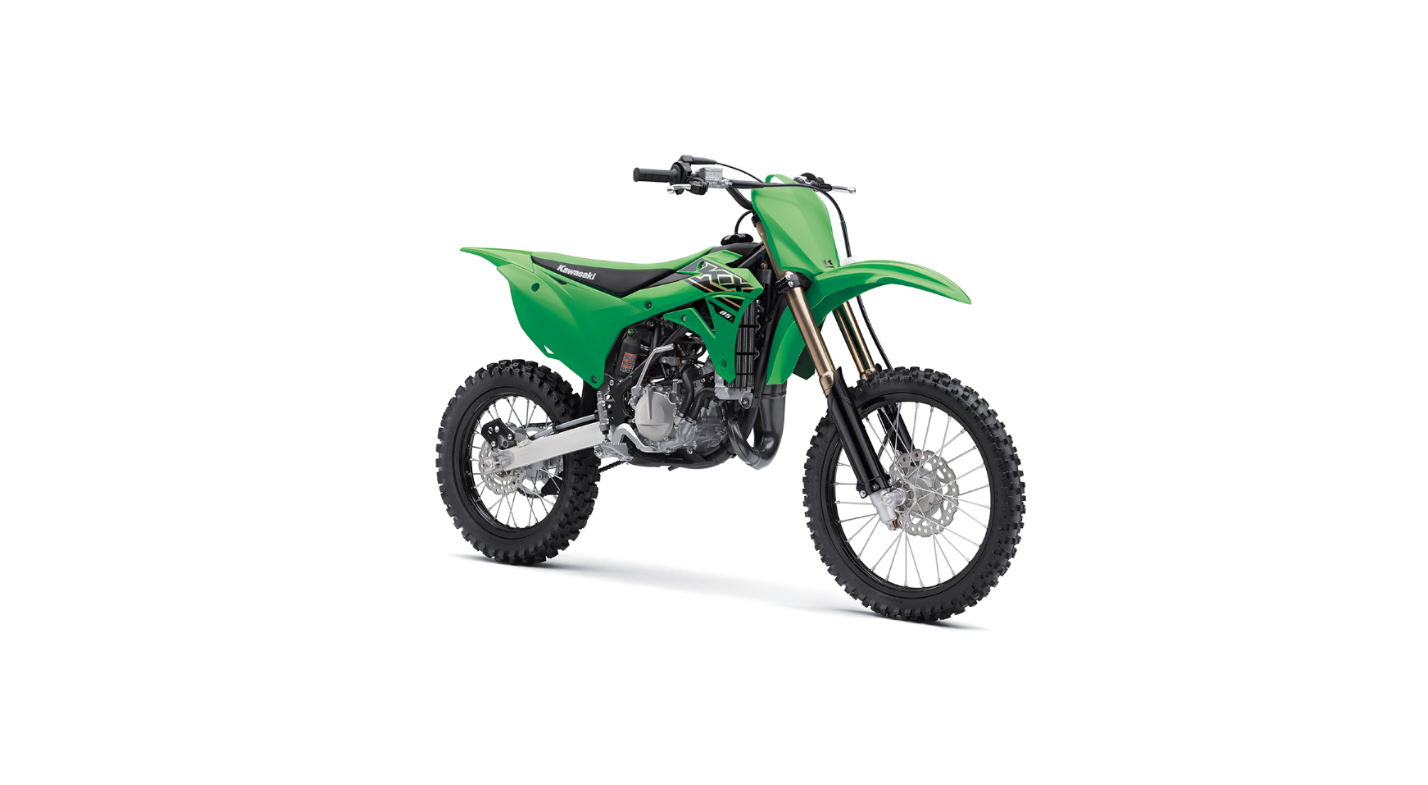2022 Kawasaki KX85 Cooling System
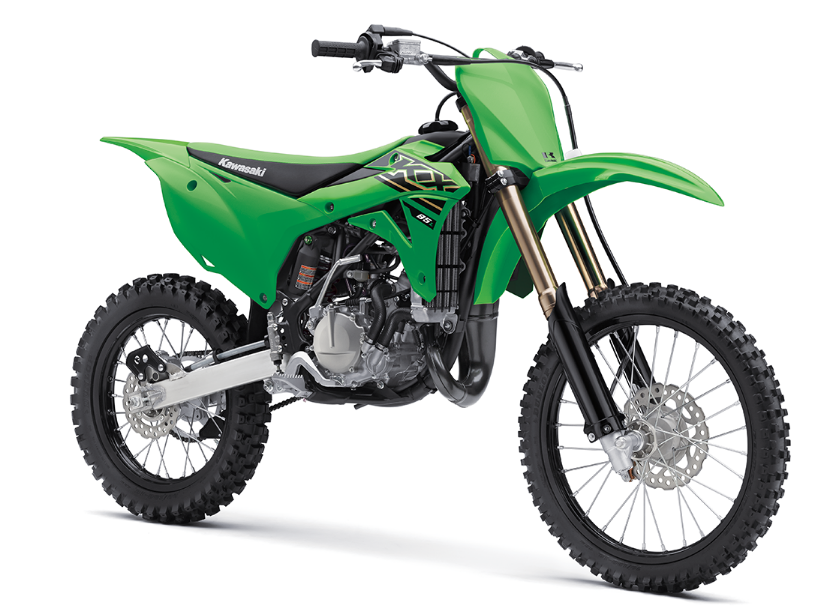
Cooling System
Water Hoses
Check the water hoses for cracks or deterioration, and the connections for looseness in accordance with the Periodic Maintenance Chart.
Radiator
Check the radiator fins for obstruction by insects or mud. Clean off any obstructions with a low-pressure stream of water.
NOTICE
Using high-pressure water, as from a car wash facility, could damage the radiator fins and impair the radiator’s effectiveness. Do not obstruct or deflect airflow by in-stalling unauthorized accessories in front of the radiator. Interference with the cooling airflow can lead to overheating and consequent engine damage.
Coolant
The coolant absorbs excessive heat from the engine and transfers it to the air through the radiator. If the coolant level becomes low, the engine overheats and may suffer severe damage. Check the coolant level each day before riding the motorcycle, and re-plenish the coolant if the level is low.
WARNING
The cooling system can get extremely hot during normal operation and cause serious burns. Do not touch the radiator when it is hot, nor open the radiator cap. Hot coolant inside will cause severe burns.
NOTICE
Use coolant-containing corrosion inhibitors made specifically for aluminum engines and radiators in accordance with the instruction of the manufacturer. Soft or distilled water must be used with the antifreeze in the cool- ing system. If hard water is used in the system, it causes scale accumulation in the water passages, and considerably reduces the efficiency of the cooling system.
NOTE
The coolant originally filled into the cooling system contains 50% of a permanent, ethylene-glycol -based antifreeze, has a freezing point of-35°C -31F) and a green appearance.
Coolant Level Inspection
- Situate the motorcycle perpendicular to the ground until the radiator cap is level with the ground so that the radiator cap is located uppermost in order to exhaust the air accumulated in the radiator.
- Remove the radiator cap in two steps.
- First, turn the cap counterclockwise to the first stop and wait there for a few seconds.
- Then, push down and turn the cap further in the same direction and remove it.
A. Radiator Cap
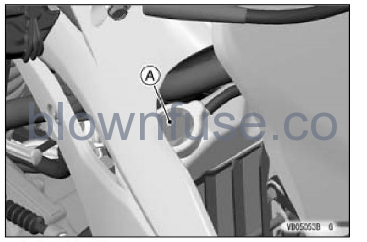
Check the coolant level in the radiator. The coolant should come up to the bottom of the radiator filler neck.
NOTE
Check the coolant level when the engine is cold (room or ambient temperature).
A. Coolant Level
B. Radiator Filler Neck
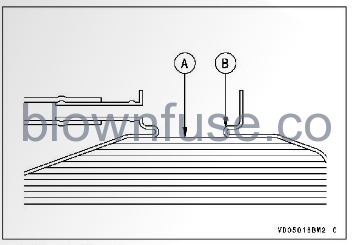
If the coolant level is low, add coolant through the radiator filler opening to the bottom of the radiator filler neck.
Recommended Coolant Mixed Ratio
Soft water 50%, coolant 50%
Recommended Coolant Type
A permanent type of antifreeze (soft water and ethylene glycol plus corrosion and rust inhibitor chemicals for aluminum engines and radiators)
Coolant Total Amount
0.57 L (0.60 US qt)
- Install the radiator cap in two steps.
- First, turn the cap clockwise to the first stop.
- Then, push down and turn the cap further in the same direction.
Coolant Change
The coolant should be changed periodically to ensure long engine life.
- Wait for the engine to cool completely. Situate the motorcycle perpendicular to the ground until the radiator cap is level to the ground.
- Drain the coolant from the engine and radiator as follows.
- Place a container under the coolant drain bolts at the water pump cover and right side of the cylinder.
- Remove the radiator cap in two steps (see Coolant Level Inspection in this section).
- Remove the coolant drain bolts and the gaskets.
A. Coolant Drain Bolt (Water Pump) and Gasket
B. Water Pump Cover
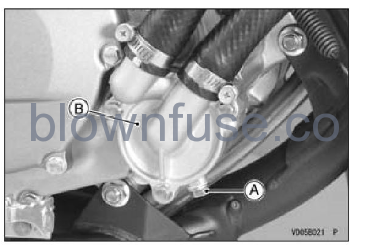
A. Coolant Drain Bolt (Cylinder) and Gasket
B. Right Side of the Cylinder
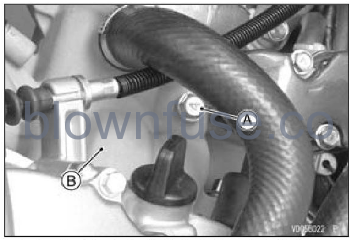
NOTICE
Immediately wash away any coolant that spills on the frame, engine, or wheel.
WARNING
Coolant on tires will make them slippery and can cause loss of traction resulting in an accident and injury. Thoroughly clean any coolant that might have splashed on the tires.
- Visually inspect the old coolant.
- If whitish cotton-like wafts are observed, aluminum parts in the cooling system are corroded and the system must be flushed.
- If the coolant is brown, iron or steel parts are rusting and the system must be flushed.
- Check the cooling system for damage, loose connections, and leaks.
- Install the coolant drain bolts with their new gaskets at the water pump cover and right side of the cylinder.
NOTE
Always replace gaskets with new ones. Tighten the coolant drain bolts to the specified torque.
Tightening Torque
Coolant Drain Bolt (Water Pump): 5.2 Nm (0.53 kgfm, 46 in-lb) Coolant Drain Bolt (Cylinder): 9.0 Nm (0.92 kgfm, 80 in lb) Fill the radiator up to the bottom of the radiator filler neck with coolant.
NOTE
- Pour in the coolant slowly so that it can expel the air from the engine and radiator. Bleed the air from the cooling system as follows.
- Loosen the air bleeder bolt on the cylinder head until the coolant begins to flow out the air bleeder bolt hole.
A. Air Bleeder Bolt and Gasket
B. Cylinder Head
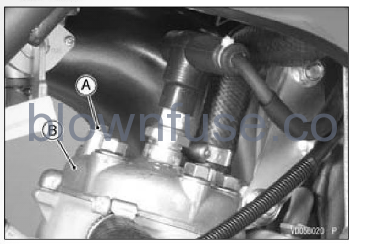
Tighten the air bleeder bolt to the specified torque.
Tightening Torque
Air Bleeder Bolt:
10 N m (1.0 kgfm, 89 in-lb)
- If the coolant level is low, add coolant up to the bottom of the radiator filler neck.
- Tap the water hoses to force out any air bubbles caught inside.
A. Air Bubbles
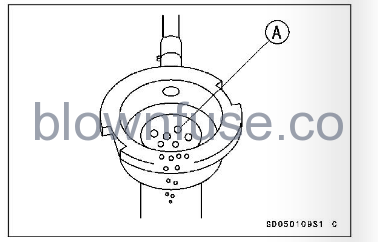
- Check the coolant level (see Coolant Level Inspection in this section).
- If the coolant level is low, add coolant up to the bottom of the radiator filler neck.
- Install the radiator cap (see Coolant Level Inspection in this section).
- Start the engine and warm up thoroughly, then stop it.
- Check the coolant level after the engine has cooled down.
- If the coolant level is low, add coolant up to the bottom of the radiator filler neck. Install the radiator cap.
- Check the cooling system for leaks.
